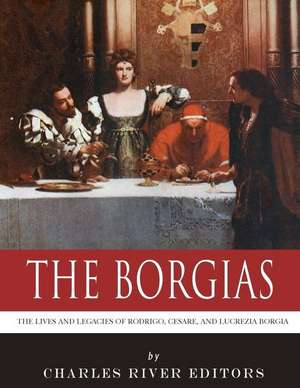The Borgias
Autor Charles River Editorsen Limba Engleză Paperback
*Examines the legends and rumors surrounding the Borgias in an attempt to separate fact from fiction.
*Includes pictures depicting the Borgias and important people and places in their lives.
*Includes a Bibliography for further reading. "Alexander never did what he said. Cesare never said what he did." - Italian Proverb
The stories and legends attributed to the Borgias have made them one of the most notorious families in history. 500 years after their deaths, they have come to be associated more with incest, political intrigue, murder and state-sponsored violence. While 21st century TV series have cast the Borgias as the first organized crime family, the rumors spread by the family's political opponents in the late 15th century have taken hold among a fascinated public. Did Cesare really have an incestuous relationship with sister Lucrezia? Did the pope really throw lavish orgies?
While Rodrigo may not have been as colorful or criminal as the enduring legends, there is no question he was manipulative, ruthless and, ultimately, effective. From an administrative standpoint, Rodrigo was a success as Pope Alexander VI, with a big assist from son Cesare. In one of the most famous political treatises in history, Niccolo Machiavelli famously advises those who hold power that it is better to be feared than loved. Though he uses Cesare as a cautionary tale about acquiring power through the good-will and powers of another person (his father, Pope Alexander VI), it is clear in The Prince that Machiavelli holds out Cesare as a skillful, effective ruler and administrator. In many ways, Cesare has been characterized as the "prince" Machiavelli tells his readers to be. As one translator of The Prince put it, Cesare is "cited as a type of the man who rises on the fortune of others, and falls with them; who takes every course that might be expected from a prudent man but the course which will save him; who is prepared for all eventualities but the one which happens; and who, when all his abilities fail to carry him through, exclaims that it was not his fault, but an extraordinary and unforeseen fatality."
The world has always had a fascination with femme fatales, and few historical women have ever been portrayed as one quite like Lucrezia Borgia. Lucrezia is a baseless, immoral villain in Victor Hugo's Lucrezia Borgia, and she continues to be depicted as a schemer and manipulator on par with her famous brother and father in film and critically acclaimed television series. Indeed, it would be hard to find another woman in the historical record who is remembered in any way comparable to the legacy of Lucrezia that remains nearly 500 years after her death.
The great irony is that Lucrezia's reputation seems to be wildly at odds with the actual woman herself. Though political opponents of the Borgias successfully portrayed Lucrezia as an incestuous schemer, Lucrezia was unusually moral for a powerful woman during the Renaissance. Aside from adultery, hardly unusual in that era, Lucrezia proved to be both an efficient and benevolent ruler when her husband was away from Ferrara, and the two of them had an unusually close and loving relationship in an era where political marriages were made out of convenience, not love.
The Borgias chronicles the lives, intrigues, myths and legends of the famous family in an attempt to separate fact from fiction. Along with pictures of important people, places, and events in their lives, you will learn about Rodrigo, Cesare, and Lucrezia Borgia like you never have before, in no time at all.
Preț: 83.69 lei
Nou
Puncte Express: 126
Preț estimativ în valută:
16.01€ • 16.72$ • 13.25£
16.01€ • 16.72$ • 13.25£
Carte tipărită la comandă
Livrare economică 04-18 aprilie
Preluare comenzi: 021 569.72.76
Specificații
ISBN-13: 9781985027763
ISBN-10: 1985027763
Pagini: 144
Dimensiuni: 216 x 279 x 8 mm
Greutate: 0.35 kg
ISBN-10: 1985027763
Pagini: 144
Dimensiuni: 216 x 279 x 8 mm
Greutate: 0.35 kg
